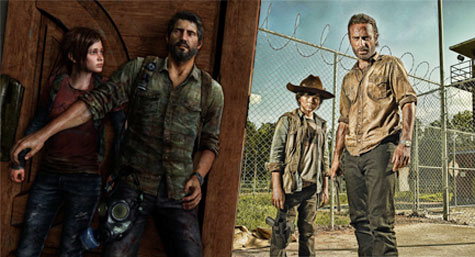
One of the most gripping elements, at least for me, is the vulnerability of the children and the lengths to which the adults will go to keep these kids alive – a theme that was front and center this past month as I almost simultaneously finished playing The Last of Us videogame and watching AMC’s They Walking Dead.
Although I’ve also played both of The Walking Dead videogames games, I’ve opted to write about the TV show and the The Last of Us because of some of the differences between game and show. (Speaking of differences, there are also many between TWD show and comics. I’ve tried to read ahead and been surprised when something doesn’t happen the way I expect. And no Darryl! I love Darryl.)
SPOILER ALERT: If you haven’t seen the last few episodes of The Walking Dead or played either of The Walking Dead games or finished The Last of Us, don’t read any further.
Children are at the core of many harrowing scenes. I couldn’t sleep for days when Sophia reeled out of the barn as a Walker. And of course a child, with no armed adult, alone in the wild, would not last. Even for adults survival is chancy at best. As Carol says in a recent episode to Mika, “You’re little and you’re sweet.” Mika can’t kill anything living, not even a deer. Although this might be a good characteristic in real life, it is not a good recipe for survival in these worlds.
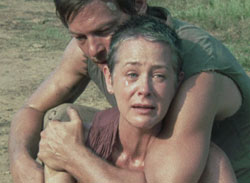 Carol is not as tough early on as she becomes later (no doubt the death of Sophia is a huge factor in her evolution) and her reaction to seeing her daughter is absolutely real. With no thought of her own safety, she races toward her little girl, to be caught and held safe by Darryl. The rest of the group, although they are well used to killing Walkers, hesitate, unwilling to kill this child. And yet, what choice is there? Rick puts Sophia down, not only to assure the safety of the group, but as a mercy. Like Carl, I burst into tears.
Carol is not as tough early on as she becomes later (no doubt the death of Sophia is a huge factor in her evolution) and her reaction to seeing her daughter is absolutely real. With no thought of her own safety, she races toward her little girl, to be caught and held safe by Darryl. The rest of the group, although they are well used to killing Walkers, hesitate, unwilling to kill this child. And yet, what choice is there? Rick puts Sophia down, not only to assure the safety of the group, but as a mercy. Like Carl, I burst into tears.
I experienced a similar reaction in a small almost throwaway scene in The Last of Us. When Joel comes upon the underground bunker, fitted up as a school with plastic toys, and the diary/note from one of the final adult survivors that tell of a desperate effort to keep the children alive, I could barely play through. And then Sam turns and has to be killed for the same reasons as Sophia. I played for another hour afterwards, desperate to see Ellie and Joel reach at least a few minutes of safety and peace.
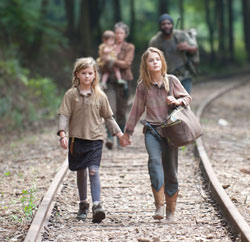 The children in these stories die from many causes, a few that I didn’t see coming. They die, not just by the infected, but from illness and murder. And sometimes at the hands of their nearest and dearest. The cannibals in The Last of Us didn’t surprise me half as much as Lizzie. It was clear from the beginning that she just didn’t get the danger presented by the Walkers. She would never get it. Something inside of her is broken. I did not expect her to kill Mika, though, and place Judith next on the chopping block. Although it is Carol who executes Lizzie, for the safety of everyone, this is a child who could not, should not survive. A girl who claims a Walker-child as a friend is always going to be at risk, and that’s without even considering her effort to kill humans so they’ll turn. I just never imagined she would kill her sister.
The children in these stories die from many causes, a few that I didn’t see coming. They die, not just by the infected, but from illness and murder. And sometimes at the hands of their nearest and dearest. The cannibals in The Last of Us didn’t surprise me half as much as Lizzie. It was clear from the beginning that she just didn’t get the danger presented by the Walkers. She would never get it. Something inside of her is broken. I did not expect her to kill Mika, though, and place Judith next on the chopping block. Although it is Carol who executes Lizzie, for the safety of everyone, this is a child who could not, should not survive. A girl who claims a Walker-child as a friend is always going to be at risk, and that’s without even considering her effort to kill humans so they’ll turn. I just never imagined she would kill her sister.
Carl and Ellie survive, at least so far. But childhood has been bled right out of them; they don’t have that luxury. Childish behavior is dangerous. Ellie’s trip to the mall results in both her and her friend Riley getting bitten. Riley of course turns and dies. And in The Walking Dead, when Rick brings Lego blocks to the prison for Carl, thinking his boy might want to play with them, Carl ignores them. He is too busy cleaning his gun. Carl is already older than his years suggest, and far too old for toys.
The one and only time Ellie exhibits any joy is when she a sees the giraffes. She knows her life will probably be a short one. As she says at the end: Riley was the first to die, then Sam. She is still waiting for her turn. Carl weeps when he witnesses the death of Sophia. But after he is forced to kill Lori so she doesn’t turn, his emotions seem frozen. Michonne is the one who thaws him. Even though I knew something bad was coming, it is so good to see him laughing on the train tracks toward Terminus.
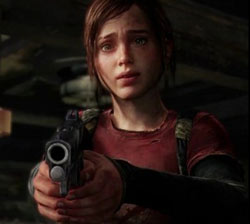 Both Ellie and Carl are already killers. They have to be. But what is the impact of killing on a child? The lines between life and death, right and wrong are blurred. Carl shoots a boy who is just running away and doesn’t see anything wrong with it. I am not convinced he knows it was wrong now even though Rick and Herschel do their best to teach him so. And maybe, in these worlds where trust can get you killed, his quickness to shoot is the safest response.
Both Ellie and Carl are already killers. They have to be. But what is the impact of killing on a child? The lines between life and death, right and wrong are blurred. Carl shoots a boy who is just running away and doesn’t see anything wrong with it. I am not convinced he knows it was wrong now even though Rick and Herschel do their best to teach him so. And maybe, in these worlds where trust can get you killed, his quickness to shoot is the safest response.
This is one of the many ethical questions raised by both The Walking Dead and The Last of Us.
While we are on that topic of ethics, especially those that concern the care of children, let’s talk about the adults. I am totally on the side of those who want to protect children at all costs. I think Carol is right to teach those kids to shoot and use a knife. In this world, being unarmed is suicidal and if those kids are to make it to adulthood, they need to protect themselves.
Rick and Joel – men in an unusual caregiving role – will do anything to safeguard their children, although it takes them both a little while to realize just how far they’ll go. Rick is already a father, but even he has to reach a point where nothing is unthinkable. In one of the last episodes, Michonne, Carl and Rick are surrounded by Joe’s band of thugs. Unarmed and captured by Joe, both Michonne and Carl under threat, Rick does the only thing he can to win; he tears a chunk out of Joe’s throat and punctures the carotid. He tells Darryl (and the audience) exactly why he did it. Rick has to keep Carl safe. That is the most important thing.
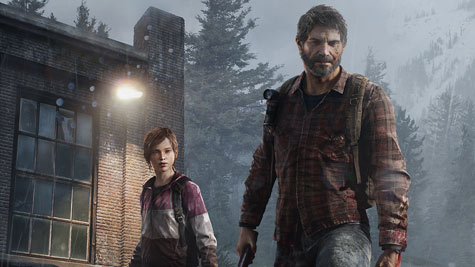
And Joel? Describing the scene where he shoots Marlene, a wounded and unarmed woman, makes him sound like a monster. But I get it. He knows that she would probably follow them and try to take Ellie. Joel is determined to keep Ellie safe and alive – to the best of his ability anyway, and I say he is right. I might feel differently if Ellie were an adult character or knew in advance what the procedure would cost her, but a child? Even a child as strong as Ellie or Carl? No way. I hope I would have the courage and the will to do the same as these men under these circumstances.
Joel and Rick arrive at this point from different starting places. Rick is a cop, but a nice guy. Early on, he apologizes to a walker crawling across the grass before he shoots her. He toughens up considerably as the weeks pass. Joel, although he may have been a nice guy before Sarah’s death, is in a dark place afterward. Just as Rick and Carl bring Michonne back to life, Ellie brings Joel back. His evolution from an emotional emptiness to the love and care of this girl brings hope and sweetness to the story. I suspect both Joel and Rick fight so hard to survive partly because they have someone depending on them. These men can’t let the kids down.
It is no accident that Joel, after he rescues Ellie, heads back to his brother Tommy’s small community. And Rick, who has bonded with Glenn and Michonne and Carol and all the others, turns to Darryl and says, “You are my brother.” After all of the bloodshed and death, the heart of these stories is family. Even the psychopathic Governor, in his own twisted way, makes families for himself that he then tries to protect.
And ultimately what I most care about is seeing these characters find a place where they are safe, where the children can survive to adulthood, and where everyone can be happy.
I may have come to the wrong genre.
Eleanor Kuhns is the 2011 winner of the Mystery Writers of America/Minotaur Books First Crime Novel Competition. A career librarian, her most recent historical mystery featuring Will Rees, a Revolutionary War veteran turned weaver is Death of a Dyer. She lives in New York.

It’s hard for me to imagine any of these kids making it to adulthood, and I wonder whether the sacrifices made by adults for them will seem so logical or instinctive if they ever get to that age themselves. What happens when the whole generation that understood “before” is gone–what will society, if you can call it that, be like?
I would guess that of all the children, Judith will be the most capable of surviving. IF, and its a big one, she manages to make it to adolescence.
My money is on Carl (Or to Rick: Coooraaaal). He has that shoot-first mentality that is needed. But I do think [b]clare2e[/b] raises an intersting point. That mentality might be what’s needed to survive, but what happens when you’ve survived. The world will just be left with those people, and something tells me those are the kinds of people who don’t play well with others.
Whole science fiction series have been written on just that question. I would like to hope that Tommy’s community in TLOU becomes a true community with some semblance of civilization. I think it is true, though, that any community that seems safe, like the prison, comes under attack.